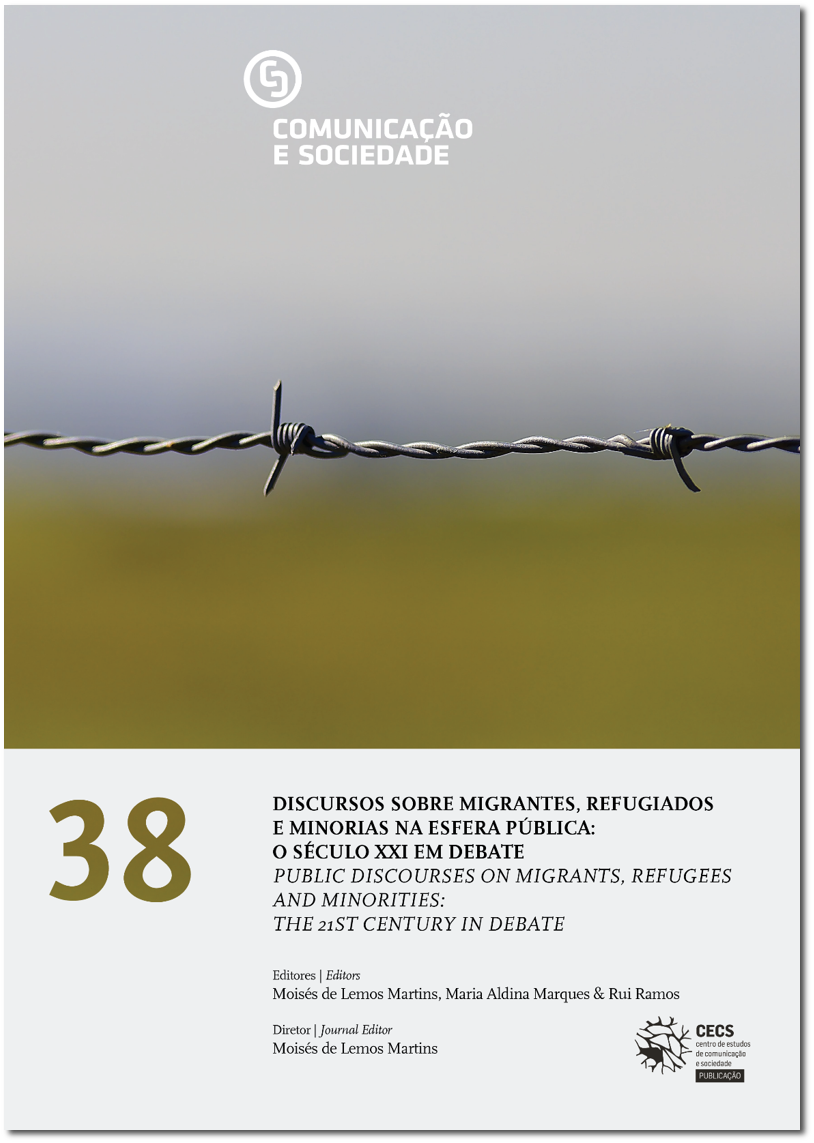Refuge and colonization of the future: borders built by words
DOI:
https://doi.org/10.17231/comsoc.38(2020).2599Keywords:
colonization, journalism, narrative, refugees, timeAbstract
This paper aims to think the forced migration to Europe under the perspective of a journalistic narrative which is based in repetitions and reiterations of words. When they produce meaning it results in a strait view where the migrant and refugee are the reason of disorder. Thus, we try to grasp how this process contributes to what we called colonization of the future, according to Giddens (2002) and Gomes (2004) concepts. In this process, an ordering is projected through the words based on a thought built during the European colonization. Its reminiscence is accumulated and form layers that appear in the journalistic narratives and on the borders. Narratives and borders are the metaphor and materialization of the conflict that impose to the migrant and to the refugee the condition of the difference, the condition to be the “other”. We propose that there is a journalistic narrative on the border that contributes to the production of meaning which its result is to discuss just for one perspective or just for one side of the borders. In this border scenery, thinking about a colonization of the future by the words lead us to understand that the journalism is also a constructor of invented time. To this paper, it was analysed some news from Brazilian newspaper Folha de São Paulo that were published between September and December 2015. There was in that moment a deeper debate concerning the refugees in Europe. We analysed the news from some keywords as refugees, borders and control.
Downloads
References
ACNUR, Alto Comissariado das Nações Unidas para os Refugiados. (2013). Global trends forced displacement 2012. Retirado de https://www.unhcr.org/statistics/country/51bacb0f9/unhcr-global-trends-2012.html?query=global%20trends%202012
ACNUR, Alto Comissariado das Nações Unidas para os Refugiados. (2014). Global trends forced displacement 2013. Retirado de https://www.unhcr.org/statistics/country/5399a14f9/unhcr-global-trends-2013.html?query=global%20trends%202013
ACNUR, Alto Comissariado das Nações Unidas para os Refugiados. (2015). Global trends forced displacement 2014. Retidado de https://www.unhcr.org/statistics/country/556725e69/unhcr-global-trends-2014.html?query=Global%20Trends%20Forced%20Displacement
ACNUR, Alto Comissariado das Nações Unidas para os Refugiados. (2016). Global trends forced displacement 2015. Retirado de https://www.unhcr.org/statistics/unhcrstats/576408cd7/unhcr-global-trends-2015.html
ACNUR, Alto Comissariado das Nações Unidas para os Refugiados. (2019). Global trends forced displacement 2018. Retirado de https://www.unhcr.org/statistics/unhcrstats/5d08d7ee7/unhcr-global-trends-2018.html
Arendt, H. (2016). A questão da minoria. In J. Kohn & R. H. Feldman (Eds.), Escritos Judaicos (pp. 289-299). Barueri, SP: Amarilys.
Bakhtin, M. (2010). Marxismo e Filosofia da Linguagem. São Paulo: Hucitec.
Bauman, Z. (2006). Europa: uma aventura inacabada. Rio de Janeiro: Zahar.
Bhabha, H. K. (1998). O local da cultura. Belo Horizonte: Editora UFMG.
Bosi, A. (2014). Dialética da colonização. São Paulo: Companhia das Letras.
Charaudeau, P. (2006). Discursos da mídia. São Paulo: Contexto.
Foucault, M. (2014). Vigiar e punir: nascimento da prisão. Petrópolis, RJ: Vozes.
Gallas, L. (2013, 04 de novembro). Decolonialidade como o caminho para a cooperação. Revista Instituto de Humanitas Unisinos On-line. Retirado de http://www.ihuonline.unisinos.br/index.php?option=com_content&view=%20article&id=%205253&secao
Georgiou, M. & Zaborowski, R. (2017). Media coverage of the “refugee crisis”: a cross-European perspective. (s.l.): Council of Europe Report.
Giddens, A. (2002). Modernidade e identidade. Rio de Janeiro: Jorge Zahar Ed.
Gomes, M. R. (2004). Jornalismo e filosofia da comunicação. São Paulo: Escrituras Editora.
Gomes, M. R. (2009). Jornalismo: poder disciplinar. Revista Kairós, 6, 1-6.
Gomes, M. R. (2018). Bordando o manto do mundo: prática jornalística, Volume 1. São Paulo: ECA-USP.
Grosfoguel, R. (2007). Migrantes coloniales caribeños en los centros metropolitanos del sistema-mundo. Los casos de Estados Unidos, Francia, los Países Bajos y el Reino Unido. Barcelona: CIDOB edicions.
Haesbaert, R. (2009). Dilemas de conceitos: espaço-território e contenção territorial. In M. A. Saquet & E. S. Sposito (Eds.), Territórios e territorialidades: teorias, processos e conflitos (pp. 95-120). São Paulo: Editora Expressão Popular.
Mais de 20 mil migrantes morreram em travessias no Mediterrâneo desde 2014 (2020, 06 de março). ONU News. Retirado de https://news.un.org/pt/story/2020/03/1706451
Mbembe, A. (2018). Crítica da razão negra. São Paulo: N-1 Edições.
Mignolo, W. (2005). A colonialidade de cabo a rabo: o hemisfério ocidental no horizonte conceitual da modernidade. In E. Lander (Ed.), A colonialidade do saber – eurocentrismo e ciências sociais – perspectivas latino-americanas (pp. 35-54). Buenos Aires: CLACSO Livros.
Mignolo, W. (2011). The darker side of Western modernity: global futures, decolonial options. EUA: Duke University Press. DOI: https://doi.org/10.2307/j.ctv125jqbw
Mignolo, W. (2017). Conolonialidade: o lado mais escuro da modernidade. Revista Brasileira de Ciências Sociais, 32(94), e329402, 1-18. DOI: https://doi.org/10.17666/329402/2017
Moradores gregos queimam centro de acolhida para impedir que refugiados o utilizem (2020, 01 de março). Folha de São Paulo. Retirado de https://www1.folha.uol.com.br/mundo/2020/03/moradores-gregos-queimam-centro-de-acolhimento-para-impedir-que-refugiados-o-utilizem.shtml
Nora, P. (1993). Entre memória e história: a problemática dos lugares. Projeto História, 10, 7-28.
Quijano, A. (2002). Colonialidade, poder, globalização e democracia. Novos Rumos, 17(37), 4-28.
Resende, F. (2014). The global South: conflicting narratives and the invention of geographies. IBRAAZ - Contemporary Visual Culture in North Africa and the Middle East. Retirado de https://www.ibraaz.org/essays/111/
Resende, F. (2017). Imprensa e conflito: narrativas de uma geografia violentada. In A. T. Peixinho & B. Araújo (Eds.), Narrativa e media: gênero, figuras e contextos (1.ª ed.) (pp. 105-136). Coimbra: Imprensa da Universidade de Coimbra. DOI: https://doi.org/10.14195/978-989-26-1324-6_4
Ricoeur, P. (1994). Tempo e narrativa (tomo 1). Campinas, SP: Papirus.
Sodré, M. (2012). A narração do fato: notas para uma teoria do acontecimento. Petrópolis, RJ: Vozes.
Downloads
Published
How to Cite
Issue
Section
License
Copyright (c) 2020 Comunicação e Sociedade

This work is licensed under a Creative Commons Attribution-NonCommercial 4.0 International License.
Authors own the copyright, providing the journal with the right of first publication. The work is licensed under a Creative Commons Attribution 4.0 International License.












